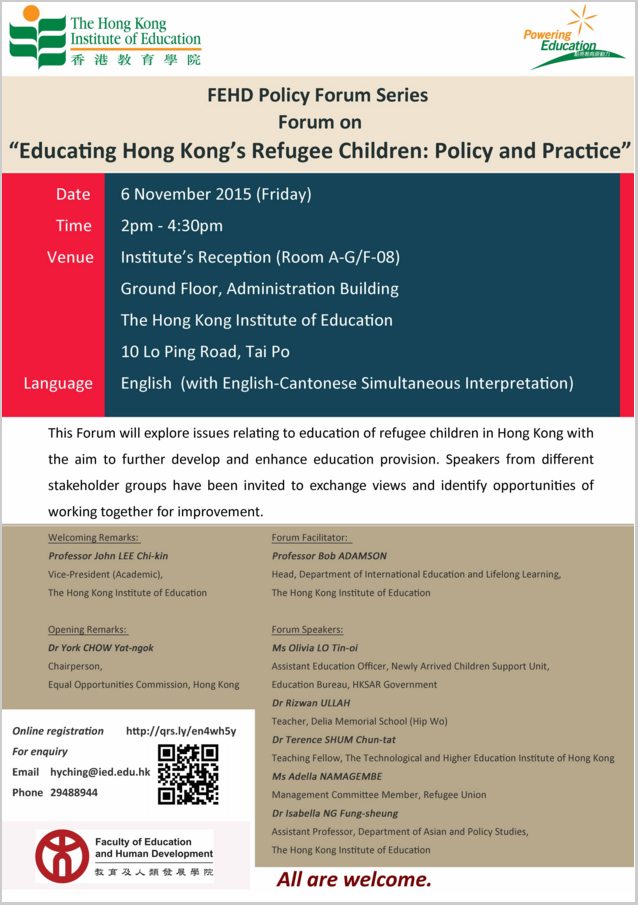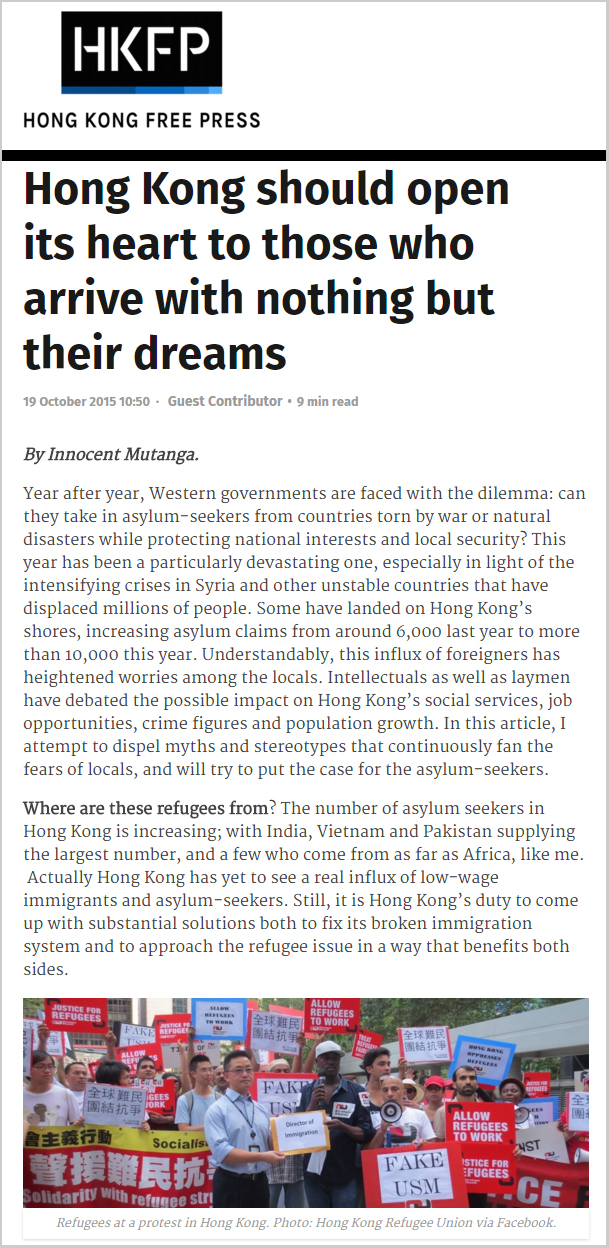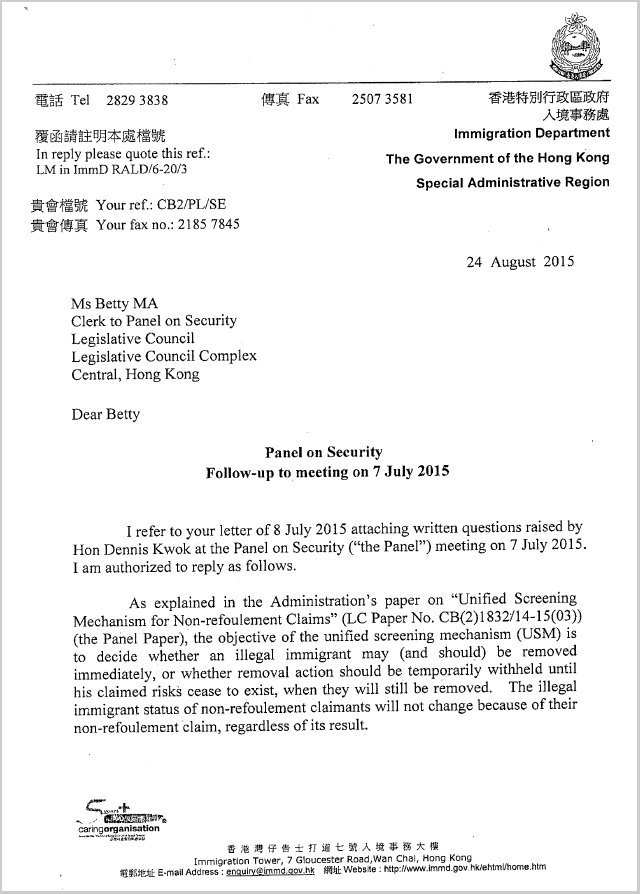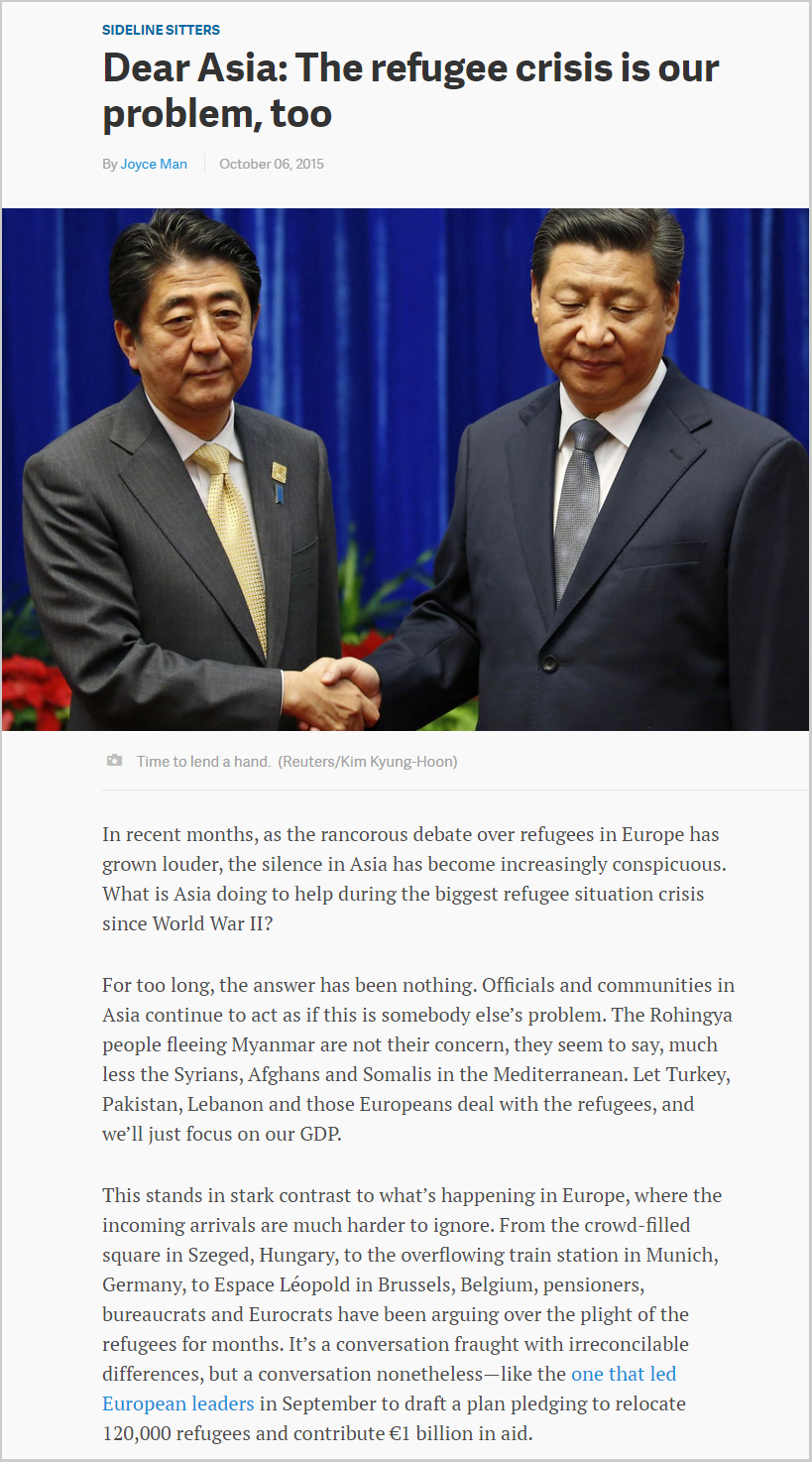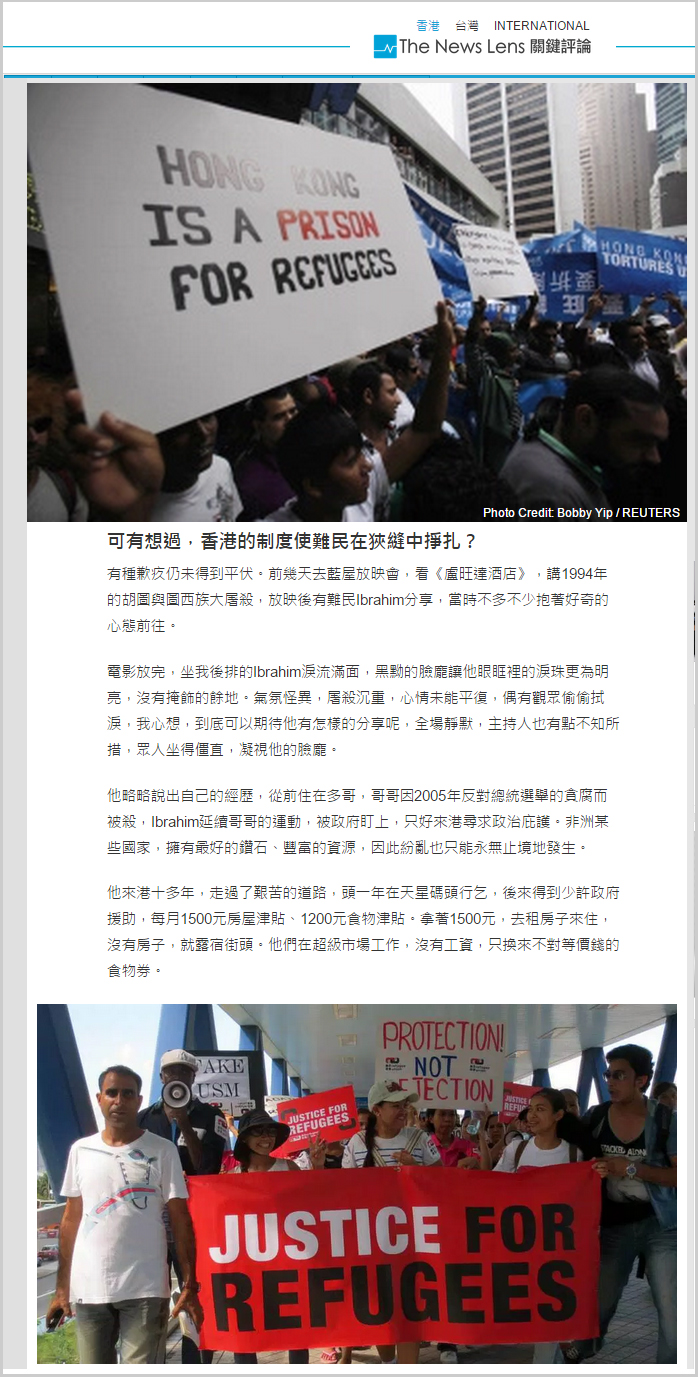Educating Hong Kong’s Refugee Children: Policy and Practice
Oct 20th, 2015 | Advocacy, Government, Schooling | Comment
Hong Kong should open its heart to those who arrive with nothing but their dreams
Oct 19th, 2015 | Media | Comment
When chickens come home to roost
Oct 19th, 2015 | Immigration, Personal Experiences, Refugee Community | Comment
As an African refugee three years in Hong Kong, I appreciate the intertwining reasons why refugees escape to what they consider “safe havens” in developed countries. They are compelled to throw caution to the wind and embarked on life’s most dangerous journey.
According to media reports, they pay large sums to smugglers who have turned their misfortune into an opportunity to earn millions of USD across different channels. Let’s not forget that refugees are not assured of reaching the Promised Land (Europe) and over 3000 lost their lives in the Mediterranean Sea this year.
It’s not that we refugees don’t know the risks we are facing. But for the majority of us these are risk worth taking as our homeland is often more dangerous than the journey. It resonates with me when they say, “It is better to die trying to flee, than doing nothing!”
For spectators sitting in comfort, it may seem like an exaggeration. I have heard many comments being thrown around in Hong Kong about desperate migrants and refugees. Most critics and haters will never understand the HELL refugees suffer in their native countries. And this happens for a variety of reasons.
First, the government propaganda doesn’t make it easier for Hongkongers to appreciate the underlying issues motivating escape and the right to claim asylum. The government discourse disseminates biased, and sometimes ridiculous, information with a view to marginalize, dehumanize and criminalize refugees who exercise a fundamental human right.
Second, the local media does not cast us in good light. We are called parasites, criminals, economic migrants and abusers of asylum. It is no wonder that the acceptance rate for refugees in Hong Kong is 0.3%. Despite 1.5 million once being refugees, Hongkongers today (conveniently) believe that none of the current 10,000 asylum seekers deserve protection. How ironic!
Third, the status determination process is shrouded in such secrecy that refugees understand little about it. The onset of USM was welcomed with much skepticism by professionals in the asylum field. This is because the previous systems failed miserably in granting protection. One year on, the USM has a dubious reputation as a process that hoodwinks refugees and those believing Hong Kong offers fair screening. How hypocritical!
Though refugees crossing the dangerous waters of the Mediterranean are in great risk of losing their lives, nevertheless they are more likely to be protected if they make it to Europe. It is very unfortunate that this crisis is happening. Its occurrence is however hardly surprising. In this, Hong Kong insensitive response to the Syrian crisis is not ambiguous.
When the Western countries invaded and destabilized North Africa, under the guise of fighting terrorism through NATO, they destroyed structures that held diverse communities together. For example, Western powers armed militias to overthrow the former Libyan strongman Murmur Gaddafi. They provided arms, logistical support and technical advice until Gaddafi was terminated.
I believe this happened because Gaddafi did not play ball with, nor bow to Western influence in Africa. Instead he vigorously opposed neo-colonial policies and the modern globalisation that ensure that Western conglomerates continued to exploit African resources with minimal benefits for local populations. He was a great advocate of the United States of Africa. So am I.
Before Gaddafi was killed he was involved in major campaigns across the African continent to bring all the countries and people together. He also offered scholarships to tens of thousands of students, yearly. But his efforts and influence were not received well by Western powers. He was perceived as a big threat to their grasp on natural resources and corrupt leaders. With Gaddafi out of the way, the 400 year pillage of Africa by Western states continues … and refugees flow north.
As for Syria, the US should take all Syrian refugees home. The US wanted a regime change in Syria through undemocratic means. The world can clearly see the consequences of western military power. They invaded Iraq on the pretext that the country held Weapons of Mass Destruction and Iraq is today a shadow of its former self. Then the warmongers moved to Syria to topple the Assad regime.
The suffering, destruction and death brought to innocent people is unimaginable. It is high time that Western powers take responsibilities for their actions. It is convenient that the US is far removed from Libya, Syria and Iraq, otherwise the States would be the ideal destination for all displaced refugees. Some commentators are rightly blaming the West for destabilizing the region and creating the refugee crisis.
Are the chickens coming home to roost?
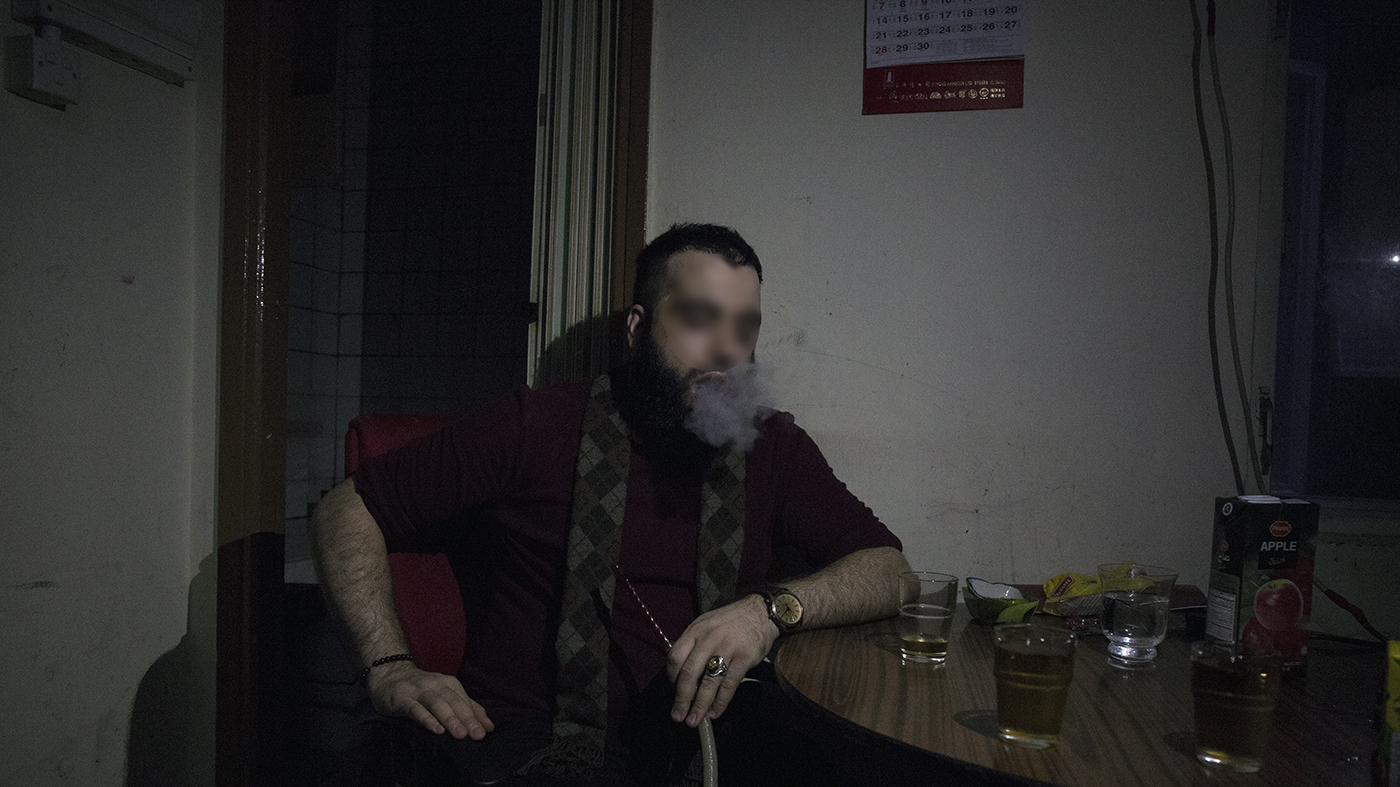
HK presents a hostile environment to those seeking protection
Oct 15th, 2015 | Crime, Immigration, Media, Rejection | Comment
The time when Hong Kong received thousands of Vietnamese asylum seekers may still be a vivid memory for some, though it is probably fading for most others. As indicated in the article below, it is true that a concerted response by the government helped to avert a greater crisis.
Yet it is often forgotten that the response was humanitarian at first, though later transformed to mark the extraneousness of unwelcome arrivals from law-abiding Hong Kong society. The camps became places of vice and lawlessness under Hong Kong’s watch. Their depiction as such was never delete from public discourse affecting policy to this day.
The present reality suggested in the article below of government-engineered hostility towards asylum seekers finds its roots in the Vietnamese era. We no longer have camps, but refugee slums have assuming the same function. The self-serving demonization of asylum seekers who take up Hong Kong’s offer of asylum continues.
As it was the case back then, asylum seekers are legally marginalized, confined in spaces of immiseration that challenge their survival. They are portrayed as abusive, criminally-minded economic migrants with little though to the reason why such survival strategies are adopted today as they were back then.
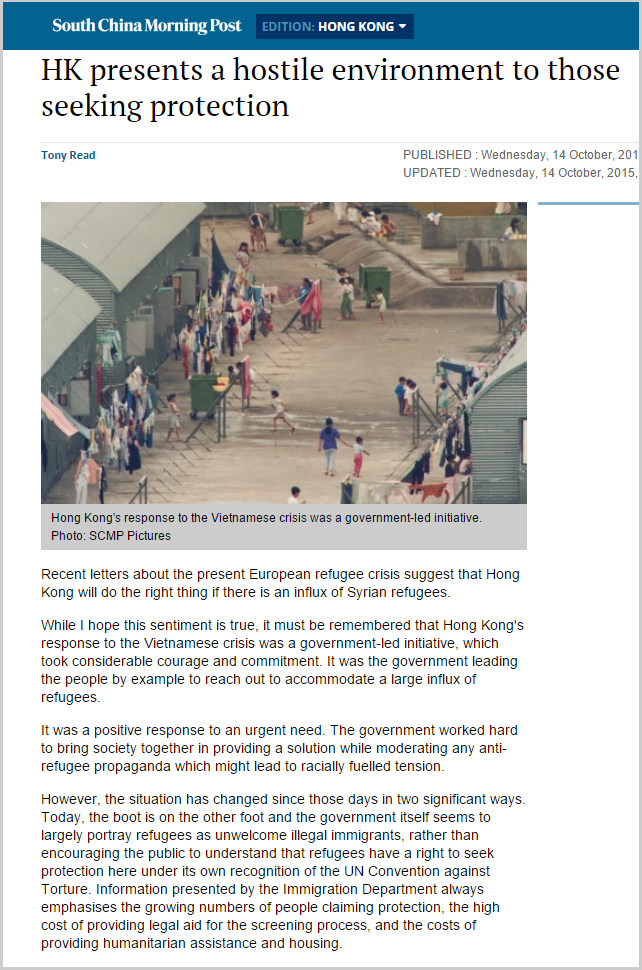
Thinking like a villager in Asia’s World City?
Oct 9th, 2015 | Advocacy, Crime, Media, Racism, VF Opinion | Comment
It is reproachable that at times persons whose opinions might be esteemed, and should thus carefully word and base statements on facts, cast judgments that verge on xenophobic intolerance, contrary to the best interest of Hong Kong. As a commentator in a local newspaper recently observed, “We often say we want to be a world Asian city, but we behave like a village”.
One example is Mr. Fung Keung’s op-ed published on 8 October in the China Daily, which contains several mistakes to say the least.
First, a rise of arrested asylum seekers from 683 to 904 in a three-year span is hardly indicative of a crime surge when contemporaneously asylum applications increased several folds to over 10,000. Comparatively, it could be argued that the crime rate among asylum seekers has decreased over the period, and indeed is quite low given that many work to support themselves. It is notorious that welfare assistance for asylum seekers is insufficient to make ends meet.
Second, that asylum seekers are arrested for crimes other than working illegally to a larger extent than before may not necessary show that asylum seekers are turning to violence. Rather it may be dependent on which crimes and who is policed in society, and related priorities of law enforcement.
Third, Fung hints that the victims “are believed to be Hong Kong citizens” and asylum seekers should not be accepted in Hong Kong because the city owes them nothing. Rather asylum seekers, when compared to Singapore, make Hong Kong dirty and unsafe, hurting citizens who would otherwise live in a peaceful environment.
Overlooking for a moment international and domestic legal obligations towards refugees, Vision First queries, does Fung really think that local citizens do not commit crimes? Who does Fung think are the employers and recruiters of asylum seekers? Who does Fung believe are the people whose behavior is learnt and with whom connections are made in local prisons by asylum seekers? Perhaps an overview of police charts would have helped Fung formulate more accurate opinions.
Fourth, it is arguable that asylum seekers borrow money from their smugglers, leaving them no choice but to commit crimes to repay such debts. This would certainly be a situation akin to trafficking, in which case Fung should be concerned of Hong Kong responsibilities in setting up a policy framework that tolerates such circumstances. In reality, research supports conclusions quite opposite to Fung’s intolerant views. Vision First would certainly appreciate if Fung agreed to disclose the research he conducted to ground such opinions. A rapid search online did not produce satisfactory results.
Fifth, Fung argues that it is “common sense” that “tells us that religious and political persecution in these countries is extremely rare”. Vision First cannot but query if the same “common sense” is used by immigration officers and adjudicator when screening asylum seekers. The increasing number of rejections being quashed by court judges, often for failure to fully appraise country of origin information, would certainly call for a revision of such unhelpful “common sense”.
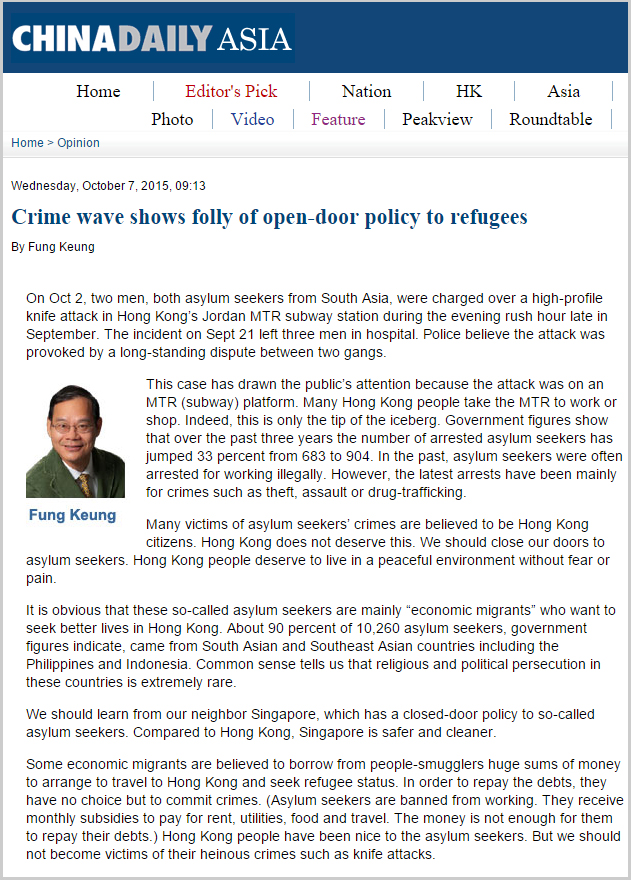
Shoplifting is a crime and I know it
Oct 9th, 2015 | Crime, Food, Personal Experiences, Welfare | Comment
Frankly it was the most humiliating experience in my life. The alarm rang when I left a Wellcome store after buying some groceries. Two members of staff stopped me and asked to look inside my backpack. They busted me for not paying for black pepper, yogurt and an air-freshener – total valued $196.
They called the police and I was taken to the back office for a preliminary investigation, before being escorted to the police station where an interpreter was called to make a statement. I was detained overnight and released on bail the following evening with instruction to attend Kwun Tong Magistracy later this month.
My offense happened in the afternoon of 3 October 2015, exactly a month after I collected from ISS-HK $1200 in Wellcome coupons for September and two days before my October appointment. That morning I neither had breakfast, nor lunch. Actually the week before the incident I only ate dinner, as food and coupons were running low.
My fridge was empty. I might as well have removed the power plug, as inside there was only bottles of tap water. My roommate and I had some oil and salt in the kitchen – nothing else. Even our knife was broken and the frying pan had seen better days. In September I paid 6 food coupons (each one worth $100) to my landlord to settle the outstanding electricity bill he pressured us to pay.
Waking up hungry on the morning of 3 October, I opened the empty fridge and asked my roommate, “Do you have any coupons left? I only have one.” He replied he had none and had recently borrowed two from a refugee. At that moment a friend called and asked to meet me in Jordan. I told him I could not, I was hungry, had nothing to eat and needed food for the weekend for myself and my roommate.
I visited a refugee nearby who lent me two coupons I promised to replace on Monday, after I collected mine for October. Then I walked to a nearby Wellcome store, where I put in the shopping basket the cheapest options for: onions, potatoes, tomatoes, fruit juice, eggs, condensed milk, teabags, sugar, bread and some other vegetables. The total bill was about $300.
When I placed some items in my backpack, I knew it was wrong. I was compelled to steal. I have never done it before in my life. It was foolish and I deeply regret it. In another lifetime … if my country were not ravaged by war … I would never steal to eat. I am a man of God who loves peace and believes in honesty. I know that stealing is wrong.
It is very hard to survive on $40 a day for breakfast, lunch and dinner. Everything is too expensive in Hong Kong. The small tub of yogurt was $85 and a necessity in our cuisine. We also needed the $32 of black pepper to cook. The air-freshener was $79. I intended to neutralize the stench in our small and damp room. I will never forget those prices I could not afford as I am not allowed to work.
As a refugee I feel that life is often beyond my control. I have to make tough choices to ration $40 for food each day. But I also used the food coupons to settle the electricity in our room. Further, my ISS-HK caseworker refused to refund $245 for cooking gas because the invoice showed my name. She requested that the gas company reissue it. However, seven times before I submitted similar receipts with my name and they were accepted. She said she would only refund $100 and I had to wait a month. That was my food money I used to pay for the gas. I felt I was cheated.
The truth is that I have never been this depressed and humiliated. My life is as damaged as my fridge is empty. My living conditions are grim and the situation is deteriorating since I sought asylum.
I am hanging by a thread that I fear will snap any moment and cast me into chaos. Hong Kong has put a timer on my life … blurring my existence … waiting for me to die slowly, slowly. I fend off thoughts of taking my life.
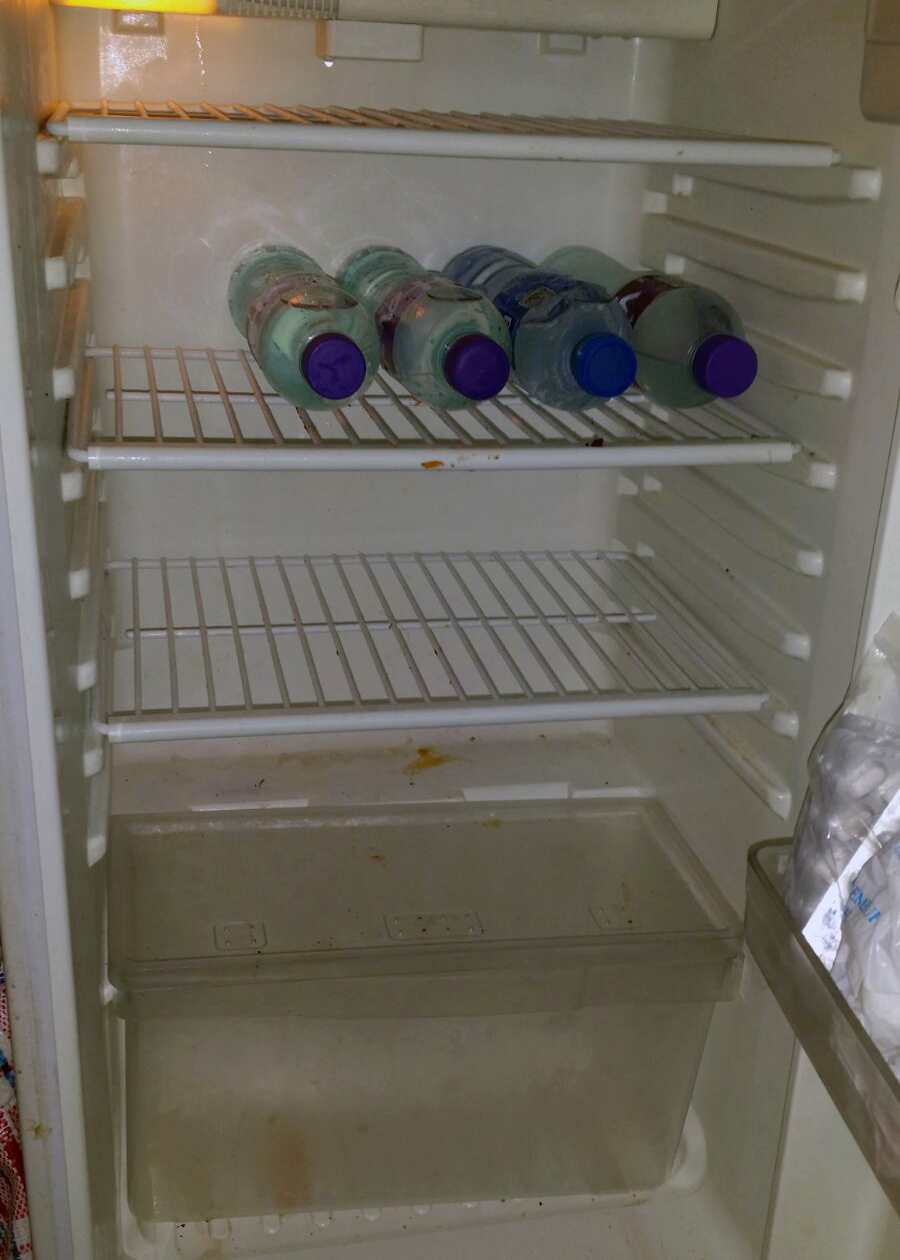
Security Bureau fails to comment on ‘cozy relationship’
Oct 7th, 2015 | Crime, Government, VF Opinion, Welfare | Comment
In reply to Vision First open letter to the Security Bureau, dated 4 July 2015
Vision First Questions:
1. Some lawyers confirm that most of their clients do not receive sufficient funds, or financial assistance in kind, or food coupons to meet their basic needs, as rents have increased and inflation has outstripped the amounts provided by SWD. This leaves refugees with no choice but to beg and frequently resort to working illegally. Is it not a fact that the increase in rents has outstripped the rental assistance provided to claimants?
2. Do you agree that thousands of asylum seekers lived for years, and hundreds continue to live, in abandoned chicken and pig farms sanctioned by the government as these were/are the only locations affordable based on government rent assistance?
3. Do you agree that such pig and chicken farms were/are not zoned for residential living? Is the government investigating why this happened and who is responsible for distributing public money to pay for illegal structures?
4. Will anyone be prosecuted for allowing dozens of refugee slums to develop and operate on funds paid from the public purse between 2006 and 2015?
Security Bureau (vague) reply:
Service users should be living in appropriate living environment. (NB: Supposedly not slums)
ISS-HK may require landlords to file supportive documents to indicate the premises’ condition.
For those assessed to be below standard, or where any illegal structures have been identified, ISS-HK would inform the service users concerned and advise them to move to another accommodation as soon as possible for the sake of their safety.
For those premises which warning letters have been issued by the Lands Department as illegal structures, ISS-HK will stop the rental payment to the landlords in the coming month.
Comment:
It is regrettably noted that the Security Bureau failed to comment on the ‘cozy relationship’ enjoyed by slum landlords who for years profitably settled refugees in makeshift huts and converted animal sheds erected on agricultural land manifestly not zoned for residential use, while ignoring the risks and dangers inherent in such questionable arrangements. Will anybody take the blame?
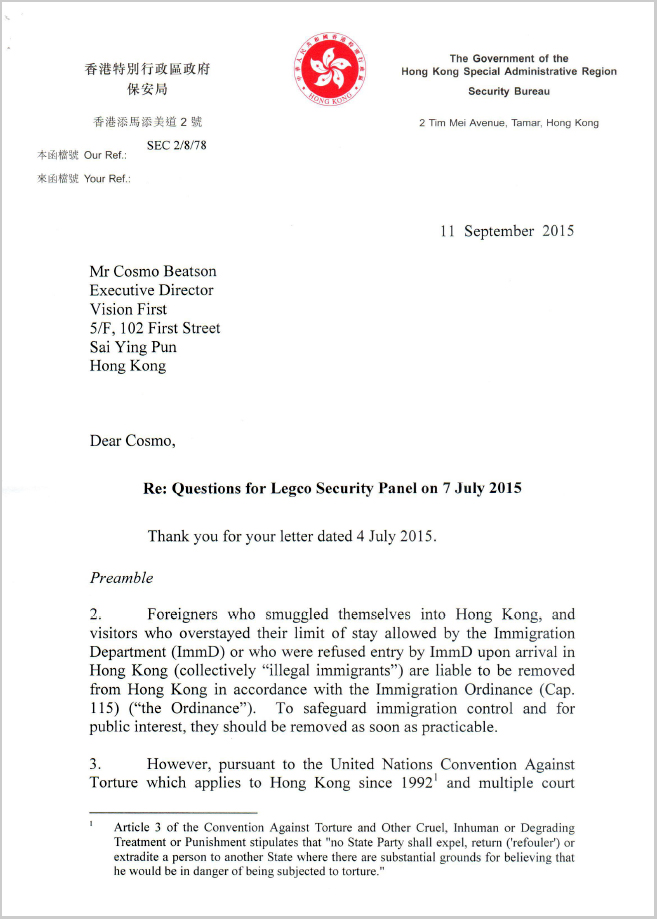
Immigration reply to Legco questions
Oct 7th, 2015 | Government, Immigration, Rejection | Comment
Dear Asia: The refugee crisis is our problem, too
Oct 7th, 2015 | Immigration, Media, Rejection | Comment
We need to change mentality, says refugee
Oct 6th, 2015 | Advocacy, Media, Refugee Community, Rejection | Comment


